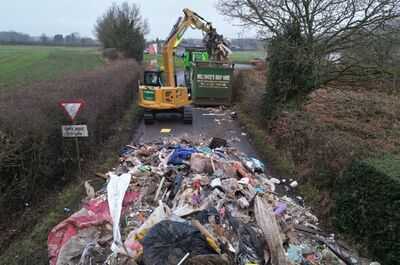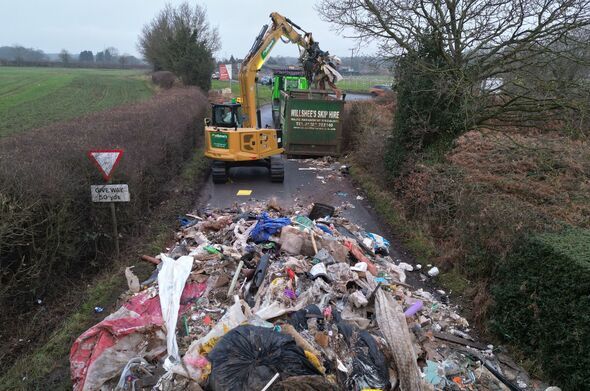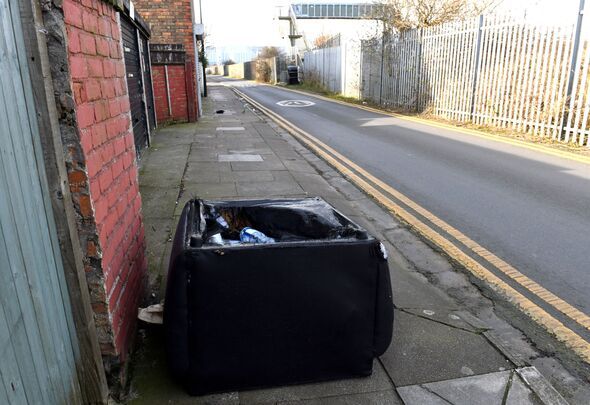

Criminal gangs are increasingly using fake waste removal firms to dump lorry-loads of rubbish illegally, a waste management expert has warned. This surge in large-scale fly-tipping is pushing councils to spend millions clearing up toxic and bulky waste dumped on public land, roadsides, and green spaces.
Latest figures from the Office for National Statistics suggest around 47,000 incidents of fly-tipping involving tipper lorry loads were recorded last year - an increase of 11% from the previous year - costing councils £13.1 million to clear. John Roberts, chief security officer at Kingdom Local Authority Support, said: "This type of fly-tipping is largely driven by organised criminals who have access to these kinds of vehicles. It could be to some degree from business waste or industrial waste, but we are seeing more and more criminals take advantage of people by scamming them with a fake waste removal."
He added: "These aren't just one-off chancers. We're talking about well-organised groups using the same tactics repeatedly - setting up fake firms, offering cheap deals online, and then vanishing before anyone can hold them accountable."
Mr Roberts explained how the gangs operate: "Fake waste removal businesses are playing a huge role, as many people don't know the laws they are subject to when getting rid of their waste, and criminals are taking advantage of this.
"They can offer cheap services to get rid of household waste, claiming legitimacy and saying they will dispose of it properly, put the waste in the back of a big lorry, take it to a highway, or bridleway, or council land - and dump it.
"With the size of vehicle, they could make hundreds of pounds from one fly-tip."
He continued: "All they need is a Facebook page or a Gumtree ad. They can disappear in a matter of hours. There's virtually no trace, no formal business records, and no accountability."

The scale and boldness of these operations make them difficult to track and stop. Mr Roberts said: "Some hotspots will have ANPR cameras to track the licence plates of the people who are fly-tipping, and enforcement officers or the police can look through waste to track down the owners, which will then hopefully lead them to the fake businesses.
"But if they are largely unregulated - just a couple of posts on Facebook or a Gumtree account that can be swiftly deleted - it can be hard to track them down."
He stressed: "Without proper digital trails or regulation, enforcement teams are playing catch-up."
Mr Roberts also issued a stark warning to members of the public, who can unwittingly find themselves in legal trouble. He said: "If people don't ask for a Waste Transfer Notice, which shows the removal of responsibility for your waste - something everyone should do when passing responsibility to someone else - they could be fined if their waste is found dumped somewhere. Fixed penalties for fly-tipping can be £1,000, and if prosecuted, it could be an unlimited fine."
He went on: "People often don't realise that even if they've paid someone to take the waste, they're still legally responsible for what happens to it. You've got to get that paperwork."
On councils' capacity to handle the growing problem, Mr Roberts said: "This depends on each council team, but there are laws out there that they can use. I definitely think more needs to be done on a societal scale to tackle the problem - if organised criminals keep expanding, eventually there will be too many fly-tips for councils to deal with. We need greater awareness from the public that something as simple as the Waste Transfer Note or doing some research can prevent this."
He added: "In some areas, fly-tipping is very normalised and people don't really view it as a crime. If everyone fly-tipped, the system would be overwhelmed. Waste removal isn't the council's responsibility, it's everyone's."
Mr Roberts also outlined the wider dangers associated with the trade. He said: "There can be a huge cost if you use a dodgy waste removal service - as well as the £400 to £1,000 fixed penalty notices depending on the offence. You can be prosecuted if you don't pay the penalty, which could go on your criminal record."
He warned: "The impact on the landscape is huge, affecting your local area, costing taxpayers money to clear up that could be better spent elsewhere, and fuels the rise of organised crime in the UK. These are not victimless crimes - they hit the public in the wallet and degrade communities."
He concluded: "It starts with an advert online and ends with a pile of waste rotting in a country lane. That's the reality."
-
Reham Rafiq’s dance at friend’s wedding goes viral

-
16 Billion Passwords, Login Details Leaked: Google, Facebook, Apple & More

-
This Easy Trick Can Help Avoid The Most Annoying Issue With ChatGPT And Gemini

-
NMCG organized ‘Yoga on Ghat’ on Yamuna coast on the occasion of International Yoga Day

-
Nuno Espirito Santo signs three-year extension at Nottingham Forest
